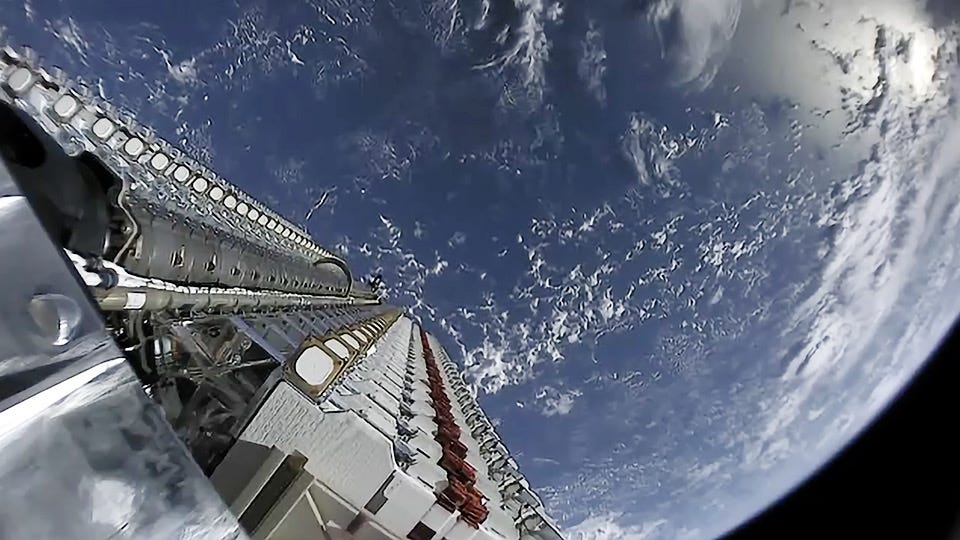I signed up for Starlink beta. I couldn't be more excited...or apprehensive
We could gain faster internet, but at what cost?
A Starlink photo shows the company’s satellites flying in orbit.
In early spring 2020, Steph and I stepped outside of our then-home in Upper Tantallon, a bedroom community of Halifax to scan the sky. Within a few minutes we saw a “train” of 61 satellites whisk past overhead. The sight of the string of bright lights speeding through the night sky was at once inspiring, wonder-inducing, and fraught with more than a little apprehension.
We’d just witnessed one of the early Starlink satellite trains meant to deliver internet to places that have next-to-none or none at all.
Starlink, of course, is part of visionary businessman Elon Musk’s enterprises, which encompass the electric vehicle division, Tesla; his battery division, Powerwall; and SpaceX, his ambitious and audacious plan to privatize space travel.
According to Forbes Magazine, Musk is the second richest man in the world after Amazon’s CEO, Jeff Bezos (who recently announced he will be stepping down from that position). Musk is currently worth some $175 billion, but of course amassing such wealth doesn’t come without its missteps.
Forbes noted that Musk removed himself as chairman of Tesla in 2018 “after making alleged "false statements" about a plan to take Tesla private, triggering an SEC probe.”
Born a South African, Musk came to Canada, and attended Queen’s University in Kingston for two years before switching to the University of Pennsylvania. His mother, Maye, was reportedly a model and dietician born in Saskatchewan.
Cut to one year later and Steph and I are living off-grid in southwestern Nova Scotia with some of the worst internet ever courtesy of Bell Mobility. We pull everything online through cellular data. It comes with a data cap, which, as a journalist with heavy online demands, I regularly surpass, necessitating a phone call to free up the excess data.
That call is always made to some far-off call centre, and has never come in under half-an-hour at the best of times as they ask for a personal identification number I’ve never received, and then proceed to grill me like Interpol. Much angst and anger ensures. Trust me. It’s not pretty.
Besides the inconvenience of the monthly call, we face other problems with our internet. Bell constantly throttles it back, slowing it down to speeds unworthy of even dial-up. Over a series of months I recorded upload and download times on various test-your-internet speed sites and received numbers beyond laughable. Writing this post tonight I tested my ‘net speed and received a score of 1.52 megabytes download and - wait for it - 0.32 megabytes upload. It’s a miracle I’m even able to upload this post at those speeds.
Add to that ridiculous bill prices for exceeding the cap - the first month here we paid $900; yes, you read that right - and like much of Nova Scotia’s rural population we are more than ready for Starlink.
One year ago this month the provincial Liberal government said they were starting to roll out the first stages of an initiative to ensure that 95 per cent of Nova Scotians have access to high speed internet. At that time, the CBC reported: “In 2018, the Liberal government established a trust fund of $193 million to achieve that objective. Currently, only 70 per cent of Nova Scotians have access to high-speed internet.”
The broadcaster further pointed out: “In addition to the money from the province, $56 million will come from municipal governments and the private companies that have signed contracts with Develop Nova Scotia to provide the upgraded internet services: Bell Canada, Xplornet, Mainland Telecom, Cross Country and Seaside Communications.”
None of this helps us, or any of the other individuals in the off-grid community who live far away from power poles, or so far off the beaten path we cannot have fibre optic cable run directly into our homes, allowing us to charge up our Ferraris and join others on the high-speed internet highway.
So last night when we received a series of emails from Starlink saying we’d been approved for the beta round of the satellite service, it caused major excitement. And not just in our household. I received an email from a friend, notifying me; and, of course, the various off-grid Facebook groups lit up with posts about the service.
The tech site Cnet explained Starlink ultimately hopes to have 10,000 satellites in the skies to ensure people in remote locations have connectivity. Currently, the broadcaster reports, Musk’s company has over 1,000 satellites in space, connecting some 10,000 people to the internet. “Eventually, Starlink hopes to blanket the entire planet in a usable high-speed Wi-Fi signal.”
A train of Starlink satellites traverse the sky.
All of this is perhaps a mixed blessing. For those of us who are off-grid and face business challenges because of substandard internet, Starlink sounds like a real solution. Even if you don’t require high-speed for business, it may come down to the fact that you want to be able to stream Netflix and Youtube while you Facebook your friends - just like most of the world.
On the downside, it’s hard not to wonder if those massive strings of satellites flying through the sky won’t diminish the wonder of the stars, their unique light, and obscure constellations and other celestial phenomena. Hence, my apprehension about the service. Even so, I signed up last night when we received notice the service would be testing first come, first served in our area.
One thing’s for sure: at this point there’s no going back.



1 satellite per 1000 people ?